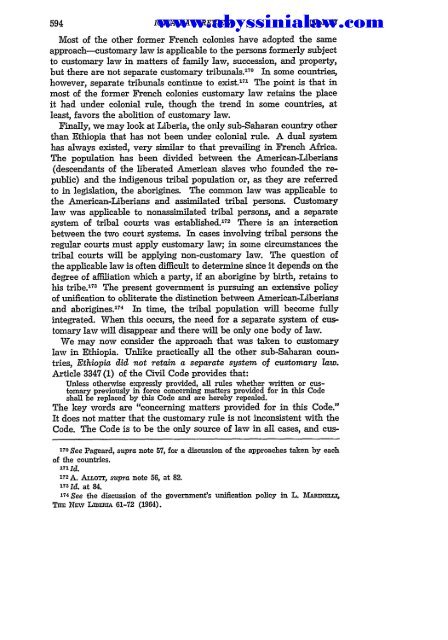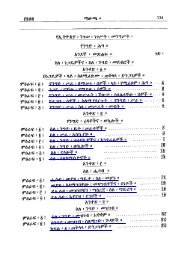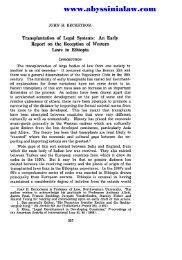Create successful ePaper yourself
Turn your PDF publications into a flip-book with our unique Google optimized e-Paper software.
IOWA LAW REVIEW<br />
Most of the other former French colonies have adopted the same<br />
approach-customary law is applicable to the persons formerly subject<br />
to customary law in matters of family law, succession, and property,<br />
but there are not separate customary tribunals. 1 70 In some countries,<br />
however, separate tribunals continue to exist. 7 1 The point is that in<br />
most of the former French colonies customary law retains the place<br />
it had under colonial rule, though the trend in some countries, at<br />
least, favors the abolition of customary law.<br />
Finally, we may look at Liberia, the only sub-Saharan country other<br />
than Ethiopia that has not been under colonial rule. A dual system<br />
has always existed, very similar to that prevailing in French Africa.<br />
The population has been divided between the American-Liberians<br />
(descendants of the liberated American slaves who founded the republic)<br />
and the indigenous tribal population or, as they are referred<br />
to in legislation, the aborigines. The common law was applicable to<br />
the American-Liberians and assimilated tribal persons. Customary<br />
law was applicable to nonassimilated tribal persons, and a separate<br />
system of tribal courts was established. 7 2 There is an interaction<br />
between the two court systems. In cases involving tribal persons the<br />
regular courts must apply customary law; in some circumstances the<br />
tribal courts will be applying non-customary law. The question of<br />
the applicable law is often difficult to determine since it depends on the<br />
degree of affiliation which a party, if an aborigine by birth, retains to<br />
his tribe. 73 The present government is pursuing an extensive policy<br />
of unification to obliterate the distinction between American-Liberians<br />
and aborigines. 74 www.abyssinialaw.com<br />
[Vol. 53<br />
In time, the tribal population will become fully<br />
integrated. When this occurs, the need for a separate system of customary<br />
law will disappear and there will be only one body of law.<br />
We may now consider the approach that was taken to customary<br />
law in Ethiopia. Unlike practically all the other sub-Saharan countries,<br />
Ethiopia did not retain a separate system of customary law.<br />
Article 3347 (1) of the Civil Code provides that:<br />
Unless otherwise expressly provided, all rules whether written or customary<br />
previously in force concerning matters provided for in this Code<br />
shall be replaced by this Code and are hereby repealed.<br />
The key words are "concerning matters provided for in this Code."<br />
It does not matter that the customary rule is not inconsistent with the<br />
Code. The Code is to be the only source of law in all cases, and cus-<br />
1 7 0 See Pageard, supra note 57, for a discussion of the approaches taken by each<br />
of the countries.<br />
71Id.<br />
172 A. ALLorr, supra note 56, at 82.<br />
13 Id. at 84.<br />
1 7 4 See the discussion of the government's unification policy in L. Musxr,<br />
Ta NEiW LrnaiA 61-72 (1964).





